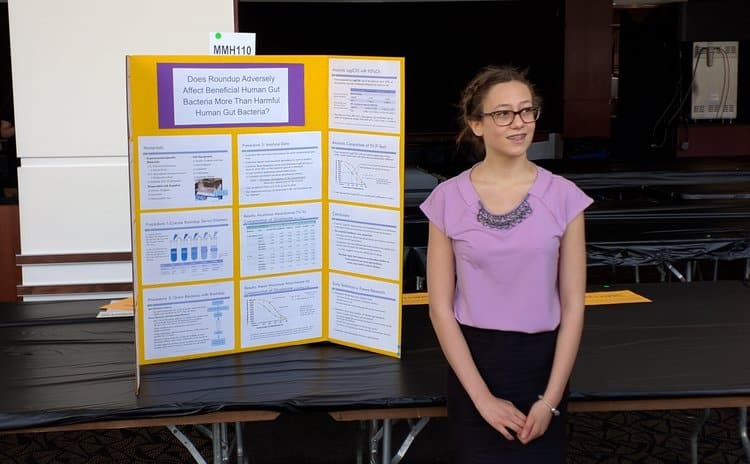
Kidsburgh hero: Ninth-grader goes national with research linking head trauma with toxic bacteria
Squirrel Hill ninth-grader Aria Eppinger has the stomach for research.
After reading a science journal article connecting head trauma with gut dysbiosis, a condition in which toxic bacteria take over the intestinal tract, Eppinger was curious to understand the causes of the affliction. A victim of head trauma as a child, the Winchester Thurston School student uncovered evidence that animals can develop the condition after exposure to the herbicide Roundup.
That research has earned the now 15-year-old attention at local and national levels. In May, her presentation, “Roundup’s Effect on Human Gut Bacteria,” won a Carnegie Science Award at Carnegie Science Center’s Covestro Pittsburgh Regional Science & Engineering Fair. She has also been selected one of 30 finalists in the Broadcom MASTERS national STEM middle school competition. STEM is an acronym for science, technology, engineering and mathematics. She received $500 and a chance to present her research and compete in hands-on challenges later this month in Washington, D.C.
As a result of her study, and the fact that gut dysbiosis can lead to cancer and diabetes, Eppinger believes Roundup should not be used on food products. Food that has been sprayed with Roundup should come with warnings, Eppinger says, so consumers can make informed decisions about what they put in their bodies.
Tom Conroy, the judge who selected Eppinger’s presentation as a winner at the regional competition, said all contestants were impressive, but Eppinger stood out. Her interview clinched it for him.
“I couldn’t get to the end of the questions. Everything I asked her she had an answer for; and it wasn’t a made-up answer,” Conroy says. “She was the best young scientist there.”
This is not the first time Eppinger’s impressive mind has brought her attention. As a fourth-grader at the Campus School at Carlow University, she bested a national field to win Warren Buffett’s Grow Your Own Business Challenge in 2012. The illuminating business concept involved using LEDs and conductive thread in a line of DIY light-up clothing for kids. She donated one-third of her $5,000 prize to three local charities.
Regardless of whatever success she finds in the nation’s capital this month, Eppinger will continue her work on human gut bacteria. She’s already learning how to measure real human gut bacteria by looking at samples from people in Pittsburgh and investigating factors affecting the different gut bacteria. The research has led her to different STEM areas like Next Generation Sequencing technologies and basic science techniques used to measure real gut bacteria. She said she still has to learn the advanced math, computer science, statistics, genetics and biology to analyze the millions of bacteria in the human gut.
In the future, Eppinger hopes to study biostatistics, which combines the best of laboratory science and math.
“I am learning about a new field called computational biology or bioinformatics, which combines biology, math, computer science, statistics, high-tech lab equipment and computers to study thousands of people at once,” Eppinger says. “It’s the next generation of biostatistics and I am excited to go down that path.”